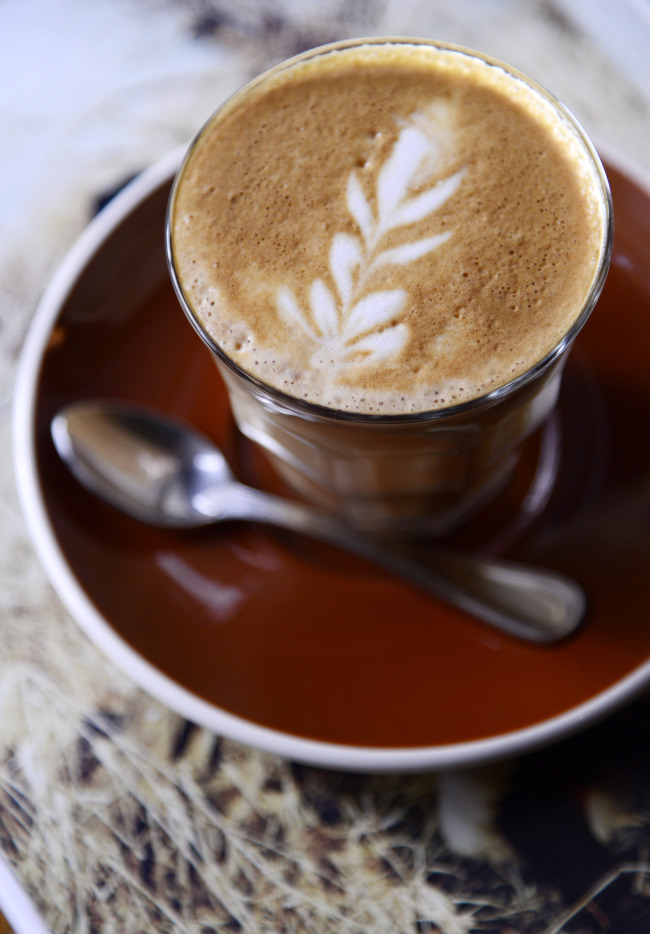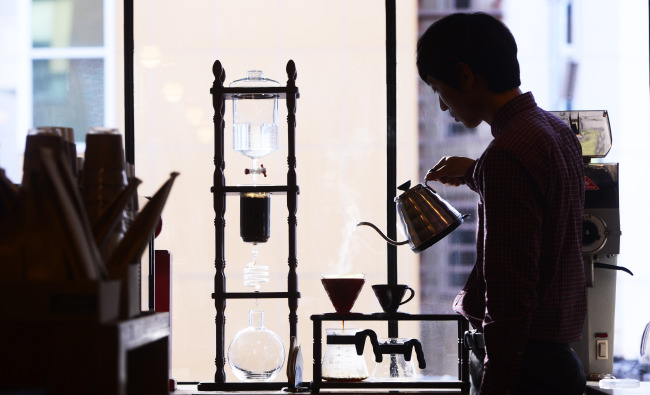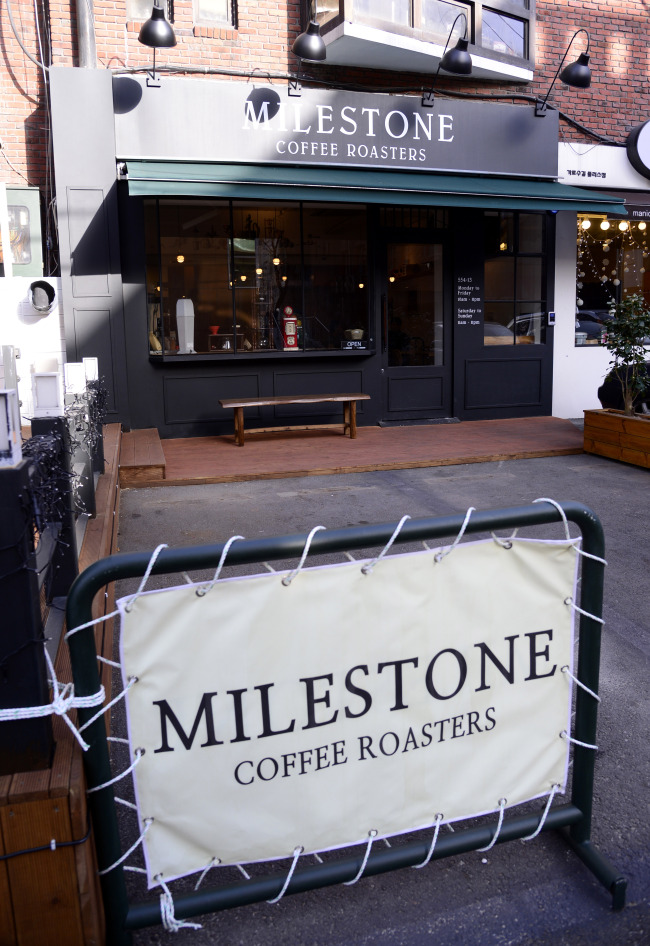Flatties and piccolo lattes at Milestone
New roaster-cafe specializes in Australian-style coffee
By Korea HeraldPublished : Jan. 3, 2014 - 19:47

Unpresumptuous and no-frills, Milestone, one of the latest artisanal roaster-coffeehouse hybrids to pop up in Seoul, manages to stand out from a bustling crowd of caffeinated hangouts with its Australian-style lineup of flat whites and piccolo lattes.
“Flatties” or flat whites are essentially espresso topped with thick, satiny steamed milk called “microfoam” for a brew that many consider stronger than a cappuccino or a latte.
Microfoam generally tends to be thick but not too airy in texture, so when poured over freshly extracted espresso, it goes straight into the brew, leaving only a little bit of foam and a substantial amount of crema on top.
All this essentially translates into a mighty tasty first sip of coffee, one that is light, creamy and rich in flavor.
The microfoam-laden flat white is prevalent in Australia and New Zealand as is its popular cousin, the piccolo latte, which Milestone Coffee Roasters owner Kim Hyung-jun describes as a milkier macchiato.

“In Australia, it is drunk often,” said Kim, 28, who crowns his piccolo lattes with the same dense, rich microfoam used for his flatties.
What prompted Kim to put flatties and piccolo lattes on his menu? Apparently, Kim spent over a good year and a half in Australia’s Sydney, sipping and downing endless cups and even picking up a few barista certificates along the way.
The on-site experience translates to solid brews crowned with well-executed microfoam, which Kim achieves by tapping and swirling the steamed milk for supple, soft foam that sinks straight into a double shot of espresso, leaving a mere centimeter of its frothy self behind.
After a couple of these, one could easily develop a craving for that combination of creamy, smooth foam that isn’t quite foam and the undiminished bang of a strong double espresso.
It is like getting the best of both worlds ― the pow of potent coffee and the soft whisper of a cappuccino.
In addition to flat whites and piccolo lattes, Kim, who roasts all his beans in-house, serves up pour-over and Dutch coffee at Milestone, which opened on a small street near Garosu-gil in late December.
“I roast all the coffee we serve, so I only do small batches daily for fresh coffee,” said Kim, who also sells beans in 100-gram, 150-gram and 200-gram servings for aficionados who want to brew at home.
All beans are specialty coffee, which by Specialty Coffee Association of America standards means the beans have been awarded points of 80 or more.
In short, the beans are premium grade.
Roast dates are penned on those fragrant little brown paper bags so that patrons know to let the beans rest and develop aromas before brewing them.
“Freshly roasted beans have almost no fragrance,” said Kim, who recommends waiting three to four days after the roast date. “They just smell like sesame seed oil.”
Kim added that the beans should ideally be consumed within two weeks, after which he believes the flavor is greatly compromised.
“I think it is good, therefore, to buy a little and often,” the roaster-barista advised.
Milestone Coffee Roasters

1F, 554-13, Sinsa-dong, Gangnam-gu, Seoul
(070) 4219-1195
Open 10 a.m. to 11 p.m. daily
Espresso-based coffee costs 4,000 won to 6,000 won, beans cost around 7,000 won for 100 grams, freshly squeezed juice and tea cost 5,000 won to 6,000 won
By Jean Oh (oh_jean@heraldcorp.com)
(070) 4219-1195
Open 10 a.m. to 11 p.m. daily
Espresso-based coffee costs 4,000 won to 6,000 won, beans cost around 7,000 won for 100 grams, freshly squeezed juice and tea cost 5,000 won to 6,000 won
By Jean Oh (oh_jean@heraldcorp.com)
-
Articles by Korea Herald






![[From the Scene] Monks, Buddhists hail return of remains of Buddhas](http://res.heraldm.com/phpwas/restmb_idxmake.php?idx=644&simg=/content/image/2024/04/19/20240419050617_0.jpg&u=20240419175937)




![[Graphic News] French bulldog most popular breed in US, Maltese most popular in Korea](http://res.heraldm.com/phpwas/restmb_idxmake.php?idx=644&simg=/content/image/2024/04/18/20240418050864_0.gif&u=)




![[From the Scene] Monks, Buddhists hail return of remains of Buddhas](http://res.heraldm.com/phpwas/restmb_idxmake.php?idx=652&simg=/content/image/2024/04/19/20240419050617_0.jpg&u=20240419175937)

![[KH Explains] Hyundai's full hybrid edge to pay off amid slow transition to pure EVs](http://res.heraldm.com/phpwas/restmb_idxmake.php?idx=652&simg=/content/image/2024/04/18/20240418050645_0.jpg&u=20240419100350)

![[Today’s K-pop] Illit drops debut single remix](http://res.heraldm.com/phpwas/restmb_idxmake.php?idx=642&simg=/content/image/2024/04/19/20240419050612_0.jpg&u=)